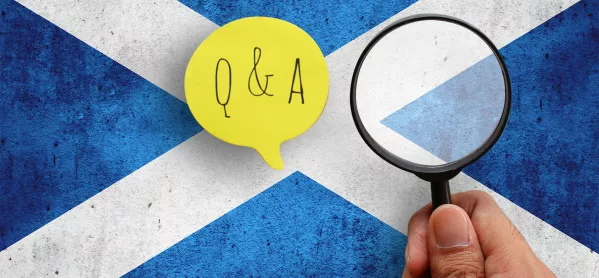Scottish school and college qualifications explained

Between 2014 and 2016, students in Scotland began taking the new national qualifications. The goal was that these would complement the Curriculum for Excellence (CfE) which schools had officially started delivering from 2010.
However, the new qualifications had barely got going before they were reformed. In October last year, the Scottish government confirmed that it planned to look again at whether the qualifications in the senior phase are fit for purpose, although the government did also say “externally assessed examination will remain part of the new system”.
An independent review of assessment and qualifications is now under way. Below, we outline how the system works at the moment and explain the variety of qualifications that current students are able to take.
What are the most popular school qualifications?
The new Nationals replaced the old system of Intermediates and Standard Grades. Nationals 1-4 are assessed within classrooms and awarded as “pass” or “fail” by a teacher or lecturer. Learners must pass all units to achieve the qualification.
The Scottish qualification that attracts the highest number of entries is National 5. N5 qualifications are externally assessed by the Scottish Qualifications Authority through an exam paper and, often, the submission of course work, although this depends on the course. N5 exams serve as most Scottish students’ first exposure to an exam hall and, in 2021, N5 had the highest number of entries of any qualification, at 297,973.
In 2021, almost 60 per cent of learners working towards a National 5 qualification were S4 students.
National 5 courses are designed for learners to progress to Higher qualifications if they choose.
Higher qualifications, unlike the A levels taken elsewhere in the UK, are mostly achieved through only one year of study. They are usually externally assessed in the May exam diet. This year was the first time in two years that national exams were able to go ahead, after they were cancelled in 2020, and again in 2021, because of the pandemic.
Higher qualifications are typically taken by S5 and S6 students. Most colleges and universities will consider Higher qualifications as part of their application processes.
In 2021, there were 194,661 entries for Higher courses.
Advanced Higher qualifications are a step up from Higher and are more specialised. The uptake for Advanced Higher courses is much lower: in 2021, there were only 26,795 entries
How are Scottish senior students graded?
National 5, Higher and Advanced Higher courses are graded from A to D or “no award”.
What other qualifications do Scottish schools offer?
Vocational qualifications are also offered including Skills for Work courses, National Progression Awards and National Certificates. These are designed “to develop and provide evidence of specific skills” and to “help learners in the world of work and everyday life”.
Skills for Work courses often include work placements and are offered at the Scottish Credit and Qualifications Framework (SCQF) levels 3 to 6. The SCQF is a way of comparing qualifications by giving each qualification a level and a number of credits. It has 12 levels and the Higher, for instance, is SCQF level 6.
In 2021, there were 13,624 entries to achieve a Skills for Work qualification, so uptake of these courses is much lower than for national qualifications courses such as National 5 and Higher. However, the government has committed to improving uptake of - and access to - vocational courses after the landmark 2014 report into “developing Scotland’s young workforce” called for the 50 per cent of students who do not attain Highers to be better catered for in schools.
That report also led to the introduction of Foundation Apprenticeships, which are offered to students in S3-S6 and provide opportunities in a wide range of sectors including accountancy, social services and the creative and digital media industry - although, again, uptake remains relatively low.
In 2020, there were 4,240 entries at SCQF levels 4-6 combined across Scotland.
How might Scottish qualifications change in the future?
When the Organisation for Economic Cooperation and Development review of the implementation of Curriculum for Excellence was published in June last year, it highlighted the “misalignment between CfE’s aspirations and the qualification system” in the senior phase of secondary. It criticised the focus on “traditional” exams and suggested use of “a wider range of assessment options”, including: more use of technology to provide online examination resources and more interactive approaches; opportunities for candidates to use computers to respond; incorporation of “e-portfolio” and personal projects for external marking; and more use of oral presentations and practicals as a way to broaden the assessment formats.
A further report, published in August, suggested that Scotland could consider “‘decluttering’ the historical diet of examinations” in upper secondary and find “alternative ways to acknowledge the end of compulsory schooling”, including moving to a “school graduation certificate”.
Now, an independent review of assessment and qualifications is under way and being led by the University of Glasgow’s Professor Louise Hayward, with her report due in the first half of 2023.
It is expected, however, that students will continue to sit the current qualifications until at least 2024.
You need a Tes subscription to read this article
Subscribe now to read this article and get other subscriber-only content:
- Unlimited access to all Tes magazine content
- Exclusive subscriber-only stories
- Award-winning email newsletters
Already a subscriber? Log in
You need a subscription to read this article
Subscribe now to read this article and get other subscriber-only content, including:
- Unlimited access to all Tes magazine content
- Exclusive subscriber-only stories
- Award-winning email newsletters
topics in this article



